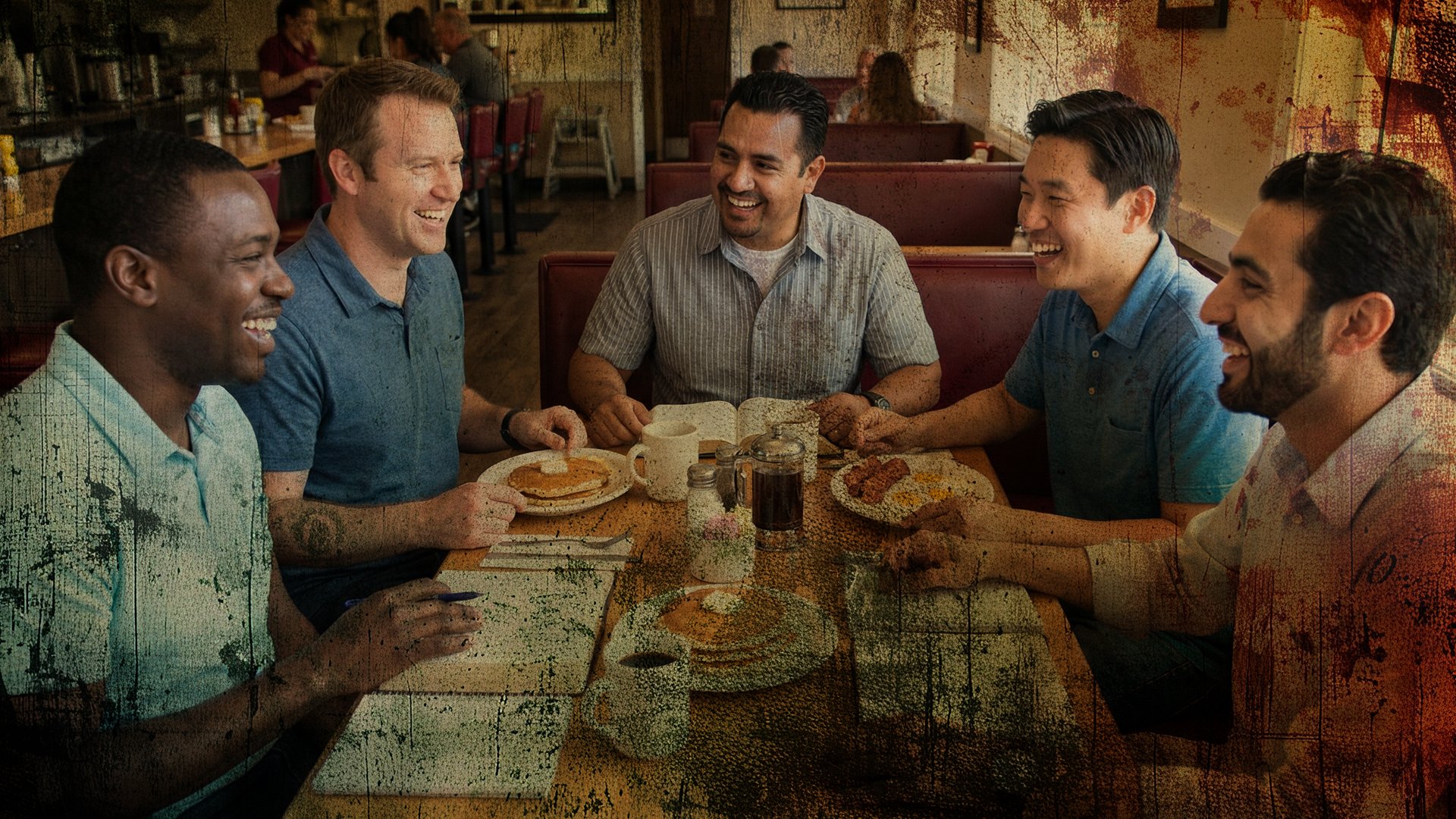In the cowboy world, a wrangler is a man in charge of controlling, taming or handling various animals. The word wrangler comes from the German word wrangeln, meaning “to dispute” or “to wrestle”. When you lead a leadership development table, you’ll eventually have to do some wrangling to keep the group on track and moving toward your fellowship’s goal. Wrangling a table is the leader’s balance of freedom to talk and build relationships, and purposeful discussion that moves men toward personal, professional and spiritual growth.
Keep it informal. When the leader makes the table time too much like a classroom, the group shuts down and becomes afraid to answer incorrectly. Always speak in a conversational tone and use your own natural vocabulary. Avoid “big, theological” words you wouldn’t use in daily talk. A table is a place to learn through dialog. Let questions linger and allow for gaps in the conversation so men can think before they talk. Listen as well to those who aren’t talking and intentionally direct opportunities their way, especially toward opinions or light conversation that can get them to open up and contribute. Nametags help newer men connect with those who have been attending for a while. Encourage men to call each other by name.
Avoid politics. Nothing severs relationships in a group faster than political differences. It’s more likely men disagree on spiritual issues and remain friends than they would on a political issue. For this reason, Friday Morning Men’s Fellowships have a standing rule to avoid political conversation. This is one of the few “rules” we enforce across all of our groups. We don’t talk about upcoming elections, or any hotly contested political issue in the news. Also avoid trying to link what the Bible says to a political viewpoint. Let the leadership and spiritual conversation rise above politics. The only activity we have related to politics is for men to pray for our leaders, whoever they may be.
When men endorse a political viewpoint, they risk alienating a large segment of potential attendees. Take a prominent issue like the Supreme Court overturning Roe v. Wade, for instance. You might assume most Christians are pro-life, but a 2023 Gallup poll indicates that just 56% of regular churchgoers are pro-life. And according to that same poll, 47% of men are pro-abortion.[1] The question, then, is do you risk bringing this up as a discussion topic on Friday morning when the view on this issue will be split down the middle of the group? Remember, the goal of the men’s fellowship is not to change a man’s political perspective, but rather to grow him in manhood and leadership.
Don’t get too social. Let Friday Morning Men’s Fellowship be the priority meeting of your men each week. When a group of 8-12 men begin meeting regularly, the temptation is to start planning additional social occasions outside of your regular table time—maybe going to a ball game, or dinner ,or out to the lake one weekend. None of these are bad ideas. But you’ll find that not every man can participate. Or the activity is such they would feel uncomfortable coming (for instance, a man who can’t swim might not go for a lake outing, or the cost of a football game might not be affordable for some).
The men at your table have committed to one thing with you—the table. Honor that commitment by limiting other opportunities outside the table that could potentially divide the group, or create an “inner circle” of men who hang out together socially apart from the table. Instead choose just a few opportunities that every man might make a priority—like a Christmas party or a kickoff event for the year. Pay attention to cost and timeframe. If there is a cost involved, have some men of greater means provide an anonymous “scholarship” for others who may have difficulty affording it.
Beware of tangents. Your discussion time should be free-flowing, and men should grow more comfortable in talking. The “ice breaker” question to begin is meant to help men get to know one another and to talk about lighthearted issues and quirks. If a man opens up and talks about a fun family or personal fact, then eventually he will grow to open up about more fundamental issues of manhood and leadership. As you move beyond the “ice breaker”, be cautious of tangents—longwinded discussions or stories that have nothing to do with the goal.
Say Friday’s discussion topic is “1 Corinthians on trustworthy leadership”. If Ted begins talking about a tough moral decision he’s contemplating at work, that is off-topic, but it’s a core issue of manhood and leadership. It’s not a tangent because you’re still accomplishing the fellowship’s purpose in that discussion. On the other hand, if Bill begins talking about his annual family ski trip to Wyoming, you’re going to want to bring the conversation back to a manhood or leadership focus: “That sounds amazing Bill. Let’s complete our leadership discussion and we can get the full story on the trip afterwards…” If you fill the bulk of your time with personal antidotes, your table will eventually dwindle out of disinterest.
Look out for agendas. An agenda is an area that is a singular focus for one or more men. That is, they steer the conversation to that topic regardless of where the discussion is designed to go. Those individuals have personal goals, interests or motives that they prioritize above the group. Agendas can be positively motivated, but still lead the table astray. A pile of good ideas and efforts is the enemy of a great table discussion.
For instance, Bob may be involved in a homeless advocacy charity outside of your Friday morning table. During table time, he may bring up a homeless ministry opportunity and begin talking about being involved in service to others in need. This is a worthy cause, but it blurs the Friday focus. And allowing one man’s priorities to usurp the discussion sends a message that other causes are fair game as well. Instead, respond kindly but firmly: “That’s a great opportunity Bob. Let’s continue our table discussion on today’s topic, and you’re welcome to connect individually with other men about the homeless opportunity after today’s discussion.”
Respect the format. Friday Morning Men’s Fellowships are designed to run from 7:00 a.m. until either 8:00 or 8:30 a.m. Be sure to start and end on time. Respect the investment made in the table by your men. Don’t spend 30 minutes rehashing last night’s football game or sharing your barbecue recipe. Have your schedule down, welcome everyone, especially guests, then get started. Better to end five minutes early than go ten minutes long. Create a sense of expectation that each man who attends will get something useful out of the morning. And leave them wanting more instead of exhausted over a long-winded and meandering discussion.
[1] https://news.gallup.com/poll/244709/pro-choice-pro-life-2018-demographic-tables.aspx
Photo: Shutterstock.com

















A creed is a formal statement of essential beliefs. The word “creed” comes from the Latin “credo” meaning, “I believe.” You can adopt The Brothers’ Creed as a statement of belief for your Men’s Table.